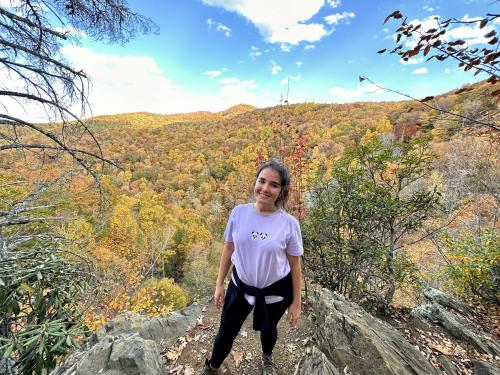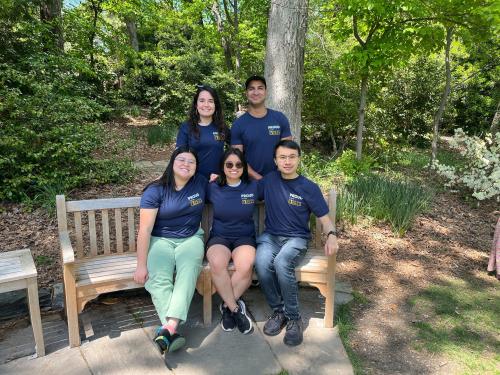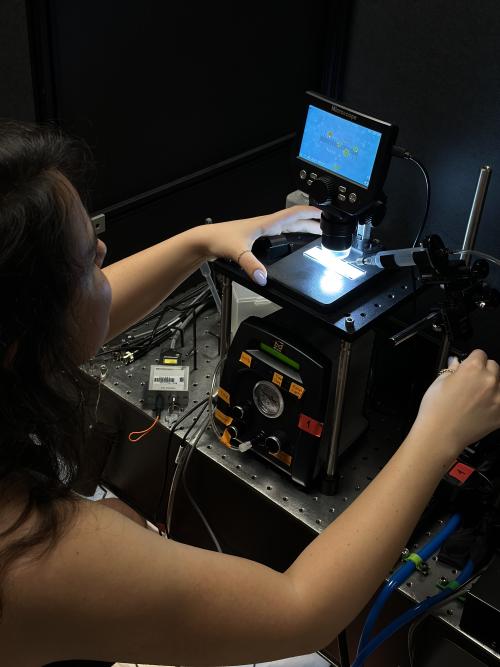
Minel Arinel
Minel enjoys solving both the daily Wordle and the mystery of the gut-brain axis. Outside of mentoring a cadre of undergraduate students on campus, you might find her exploring Durham by foot in the Duke Forest.
Trainee Spotlight is a series of interviews from the Duke Institute for Brain Sciences that showcases the science and lives of the people behind the lab coats studying the brain at Duke. Want to suggest someone for the series or nominate yourself? Email the DIBS Director of Communications Dan Vahaba.
This interview has been edited for length and clarity.
How did you get from the beginnings of your science interest to now?
I really enjoyed uncovering knowledge and finding the truth of it all. Then as I grew up, I realized that science is not fully objective—there's a lot of subjective parts to it, which made it so much fun for me. I did some undergraduate research just to try it out, and it was amazing. I did undergraduate research with a summer internship program. It was about understanding Huntington's disease and how mRNA is can be used to treat it. So that's when I realized I wanted to fully go into science—do grad school, get a PhD, and stay in academia.
Now, I'm studying the gut-brain axis. I'm mostly interested in how different foods affect behavior, as well as the neural circuitry of this connection. In humans and almost all vertebrates, there's this connection from your gut to your brain. There’s synaptic communication. We know that's there, but we're still trying to figure out what exactly the gut is telling your brain. The big impact is understanding what these internal organs are communicating to the brain and what that really means to the organism itself.
A lot of people are doing translational work with the gut-brain axis in terms of Parkinson's disease, autism spectrum disorder, epilepsy, etc. By doing more research on this, we can find more personalized therapeutics and treatment options.

What are you most excited about for the future of gut-brain research?
The reason that I got into this field is actually from a more translational perspective. I'm a big advocate for mental health. But when you look at the field, it's kind of come to a plateau. When I heard about interoception—basically how the internal organs can modulate brain activity or inform the brain—I was like, why don't we just get into this? Why don't we know more about this in the concept of mental health disorders? When I joined this field and tried to get into it, I realized that there were these fundamental concepts of the gut-brain axis that we're still missing. I’m in this process of basic science, but what will be really exciting in the end is to take basic knowledge and apply it to neuropsychiatric disorders. That will be very exciting for me.
Tell us about your side project.
I'm really interested in psychedelics research, and I always wanted to dabble in it. It's a mostly-undergrad side project, and they actively work on it under my guidance. We're basically trying to characterize the effects of this psychedelic called DOI on zebrafish behavior, just seeing what is happening in the brain when you're on a psychedelic.
Where do you call home?
For people in America, I call it Istanbul. For Turkish people. I call it Gebze. I moved here four years ago.
The nature here surprised me so much. Where I'm from is the most industrial place in Turkey, so I'm very used to breathing in smoke. I came to North Carolina and the air was so refreshing! And people are so nice here. When I walk on the street, people just say hello and have community.
What are you into right now? What are some of your current hobbies?
I love puzzles—not just physical puzzles, but also mental puzzles. Every morning, when my partner and I drive here, we play the Wordle and the Worldle. It's one of my favorite moments of the day. I love traveling as well. While I'm here in the Americas, I want to go travel South America or go to Canada, wherever my visa allows.
During COVID, I got into this thing of looking at the world map and trying to memorize it. Now, I can pinpoint every country!

What do you love to do outside of campus in the area or elsewhere?
When you're a graduate student who comes in at 8:30am and stays until the evening, you just want to go home and watch Netflix. But on days that are free, I love going hiking or just going for a walk. I like the Duke Forest and the Eno River. It's so peaceful. I have the AllTrails app and I just find a trail that would work for me and my mood. I also love going to trivia with my friends at Fullsteam Brewery, but I never know things because it's very U.S. culture-based. I just sit there and enjoy.
You mentioned loving mentorship. How are you involved around campus?
Duke F1RSTS is one group I work with. It’s a student organization for first-generation and or low-income graduate and professional students, and I’m now the co-president. Every year, we host socials and professional development workshops. We organize the annual first-generation graduate symposium, where students from around the nation hop on. We have a mentoring program between Duke F1RSTS and DukeLIFE, which is the undergraduate student organization. Right now, we're also starting a regalia assistance program for graduating students that cannot afford it, and we want to further expand that to provide emergency funds.
I'm also mentoring three undergrads right now—hopefully, it will be four in the fall. They're working with me on either the psychedelics project or the gut-brain project, and they are the best undergraduate mentees of all time. I got very lucky: They're so dedicated and ambitious. I’m so lucky to be a mentor for them and guide them through science, and see them grow over the years.

Who has inspired you to become a mentor?
I had this undergraduate PI Dr. Batu Erman in my junior/senior year who was a big inspiration. A huge reason that I am in the United States doing my PhD is that he has been so supportive. I base my mentorship off of him. He's so friendly and always available, and I felt comfortable having an open communication with him. He really established that with everyone in the lab. That's has been very important for me, and it’s what I always keep in mind so that everyone in lab knows exactly what's going on and understands the science. He's my biggest inspiration.
What do you want to do after your time at Duke?
My big, big dream is to be an independent fellow. You get to have your own lab members, and after a certain period of time you have a committee. If they say yes, you automatically become a faculty at that institution.

What is a pearl of advice that you've learned throughout your time in academia?
The thing that really helped me get to the place that I am in is to speak up. I’ve voiced my interest or my concerns. I speak up to my lab members, and that always helps create a better lab environment. Just coming to the United States and being able to live and work here is absolutely amazing. It's one of my biggest accomplishments, and I got to this place by staying true to myself and speaking up whenever I needed to.
If you are a Duke undergraduate, graduate, or postdoc student studying the brain and would be interested in taking part in an interview for this series or would like to nominate somebody, please reach out to Dan Vahaba, Director of Communications at DIBS.